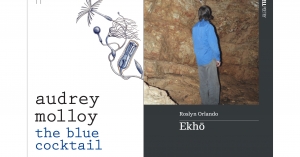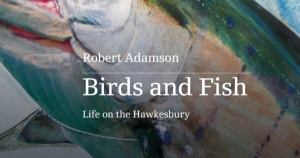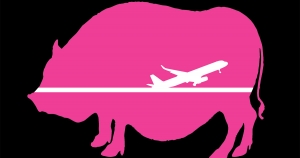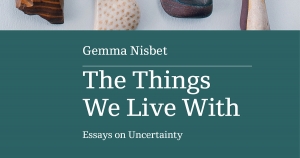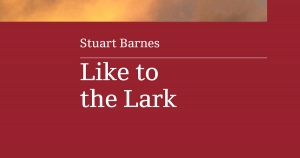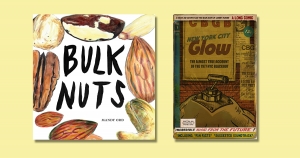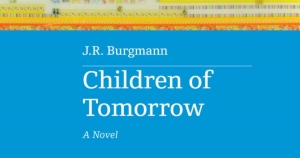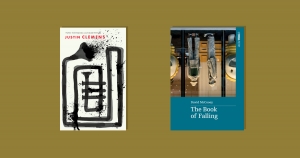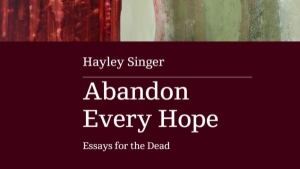Upswell
Sam Ryan reviews ‘The Blue Cocktail’ by Audrey Molloy and ‘Ekhō’ by Roslyn Orlando
Identity is a hard thing to define. What makes us who we are? We have social identities, shaped by our affinities and proximities to social groups, cultural identities informed by values, languages, rituals, traditions, and a whole multitude of different phenomena that combine to make us who we are.
... (read more)Simon West reviews ‘Birds and Fish: Life on the Hawkesbury’ by Robert Adamson and edited by Devin Johnston
In the year leading up to his death, the poet Robert Adamson (1943-2022) gathered together a selection of his work that focused on one of his enduring passions: the birds and fish of the Hawkesbury River, beside which Adamson lived much of his life. Adamson was best known for exploring this passion in poetry, but the pieces collected in this new book are works of prose and include selections from Adamson’s autobiography Inside Out (2004), and from his late collection, Net Needle (2015). They also include material that is likely to be less familiar to readers, pieces published in the magazine Fishing World, and extracts from a journal Adamson kept between 2015 and 2018 titled ‘The Spinoza Journal’.
... (read more)Des Cowley reviews ‘Fat Chance: Journalism poems’ by Kent MacCarter
Fat chance. A million to one. Buckley’s. We’ve all come across bizarre tales of survival that defy belief. Take the case of sixty-year-old Hiromitsu Shinkawa, found floating ten miles out to sea, clinging to the roof of his house, days after a tsunami wiped out his home town in the Fukushima prefecture of Japan in 2011. What were the odds?
... (read more)Francesca Sasnaitis reviews 'The Things We Live With: Essays on uncertainty' by Gemma Nisbet
The interconnected essays in Gemma Nisbet’s début collection, The Things We Live With, revolve around a premise that is as familiar as Marcel Proust’s madeleines or W.G. Sebald’s images: that things – objects, documents, photographs, even colours – evoke memories of the past. Her essays shift seamlessly from childhood to adult travels, jobs, relationships, and the problems that can lurk beneath a functional exterior.
... (read more)Frank Bongiorno reviews 'Prudish Nation: Life, love and libido' by Paul Dalgarno
Max Dupain's portrait of Jean Lorraine, a favourite model among Sydney’s artists and photographers of the 1930s and 1940s, graces the elegant cover of Paul Dalgarno’s Prudish Nation. All that gives a somewhat misleading impression of the nature of this book. It is not a work of history. Nor is it an investigation of whether Australia is a notably prudish nation. The variety of gender and sexual identities examined certainly does not leave an impression of prudishness. If Australia was once prudish, it is obviously less so now.
... (read more)A book review is a review of a book. This sounds obvious enough but can put the reviewer in a position they would not wish to be in as a more casual reader: that of not just reading a book’s poems, but also feeling a need to attend to the rest of the book – that is, the book’s paratexts.
... (read more)The strength of comic strips, like poetry, can derive from concise language and startling images. With Bulk Nuts, the latest addition to Mandy Ord’s long list of autobiographical comics and graphic novels, the Melbourne cartoonist attains a new level in her work. One of the ways she does this is by cutting back on words and presenting more considered, finished drawings. Through verbal economy and graphic surety, this collection of comic strips directs our flow of reading deftly from word to image and back again. Several stories end with the light gravity of a haiku or the hesitancy of e.e cummings.
... (read more)Naama Grey-Smith reviews 'Children of Tomorrow' by J.R. Burgmann
James Burgmann-Milner (writing under the suitably sci-fi alias J.R. Burgmann) knows his cli-fi, or climate fiction. A teaching associate at the Monash Climate Change Communication Research Hub, he received his PhD for research on the representation and communication of anthropogenic climate change in literature and other popular media. He is the co-author of Science Fiction and Climate Change: A sociological approach (2020) and has also contributed several insightful reviews of cli-fi works in ABR in recent years, including those of Ned Beauman, James Bradley, Kim Stanley Robinson, and Richard Powers.
... (read more)Judith Bishop reviews 'The Book of Falling' by David McCooey and 'A Foul Wind' by Justin Clemens
In a world both foul and fallen, where delusion, death, and unassailable Dummheit seem to wait on every corner, what can poetry do that warrants our rapt attention more than every other kind of distraction? Justin Clemens voiced the common lament when he wrote, ‘No-one reads poetry anymore, there being not enough time and more exciting entertainments out there.’ The issue, he said, is ‘a materialist problem that has always proven fundamental for poets: how to compose something that, by its own mere affective powers alone, will continue to be read or recited’ (‘Being Caught dead’, Overland, 202, 2011). That clinches the dilemma rather well. And yet, entertainment or not – and effective or not in their affective power – poetry collections seem to endure as a place, of Lilliputian dimensions, to encounter other worlds and world views.
... (read more)There is a slaughterhouse-like logic to the way humanity’s mistreatment of animals tends to be written about. Repetitive. Relentless. Atrocity piles upon atrocity, with no hope of remedy. Readers, probably appalled by the abattoir to begin with, likely vegetarians or vegans or animal fosterers, discomfort themselves yet again in the name of … what exactly? Duty? Academic interest? A renewed sense of the righteousness of animal liberation? We read on grimly, plumbing the depths of a despair that would feel commonplace if it didn’t remain, always, so excruciatingly raw.
... (read more)
